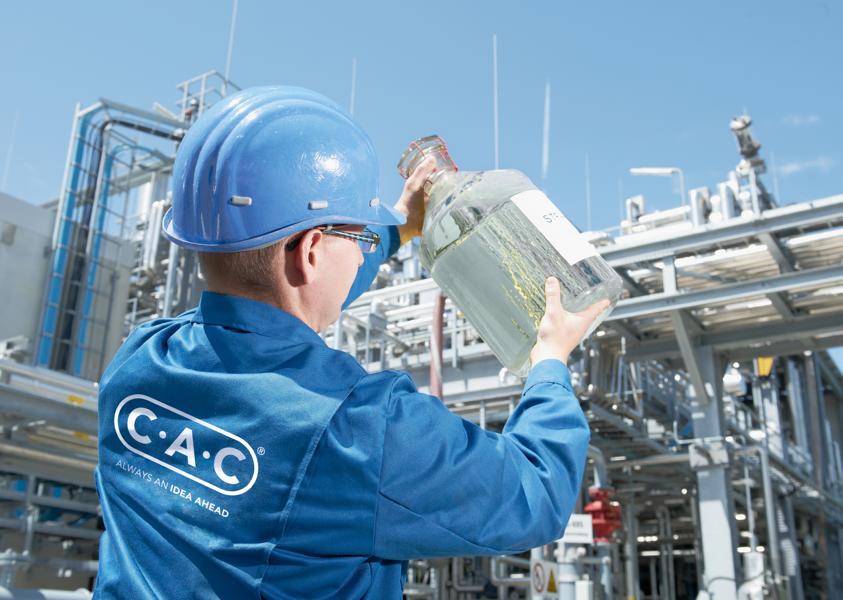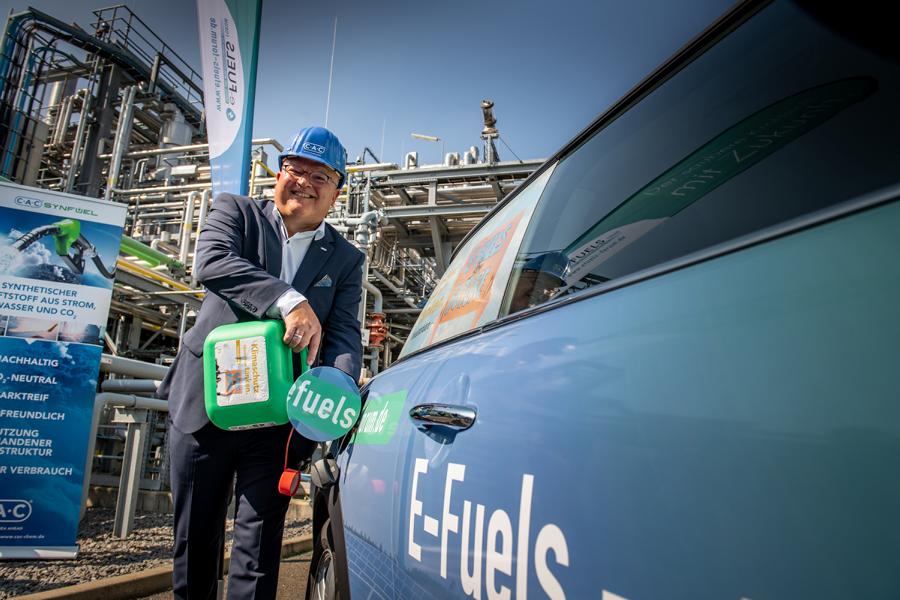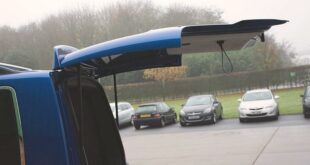International automobile and motorcycle manufacturers as well as development service providers such as FEV certify that the synthetic gasoline from Chemieanlagenbau Chemnitz, CAC for short, is 100 percent compatible with the existing vehicle fleet. This means that every vehicle with a petrol or Otto engine can be driven in a climate-friendly manner. The technology for the production of this e-fuel was developed by CAC with the support of the TU Bergakademie Freiberg, implemented as Europe's largest test facility in 2009 and is ready for large-scale production - provided that the political course is set.
CAC e-fuel
The conclusion of the motor vehicle manufacturers and the development service providers is based on the results of the joint project "Closed Carbon Cycle Mobility", C3-Mobility for short, which was completed at the end of 2021. The aim was to develop climate-neutral fuels for tomorrow's mobility. Based on many years of cooperation with the TU Bergakademie Freiberg, CAC is the technology provider for the gasoline synthesis in the project. Based on methanol, which is produced from carbon dioxide (CO₂) and "green" hydrogen (H2), among other things, CAC has developed the patented process that does not require fossil raw materials. With the large-scale test facility at the TU Bergakademie Freiberg, around 46.000 liters of synthetic petrol were produced as part of the project and made available to the automobile manufacturers for engine and fleet tests. Here, green methanol of biogenic origin was used and converted into petrol in a patented, market-ready process.
equivalent to fossil fuel
The results of the project partners were consistently positive and were published at the final event of the project. In all properties, such as material compatibility, CO₂ emissions and fuel consumption, synthetic gasoline is equal to fossil gasoline - even more advantageous in terms of oxidation stability and particle emissions. As an E10 blend, the drop-in-capable synthetic petrol meets the requirements of the DIN EN 228 standard, is registered under REACH and can replace conventional fossil fuels directly or be added to them – without any technical modifications to the vehicle. "The confirmation of the project partners is a great success for our technology, because climate protection requires openness to technology," explains Jörg Engelmann, Managing Director of CAC.
“The establishment of this gasoline synthesis process is an important step towards closing carbon cycles with the help of electrical energy. In this way, regeneratively generated electricity can be stored in a long-term stable, CO₂-neutral fuel that can also be made available in times and regions with little sun and wind,” says Prof. Martin Gräbner, Director of the Institute for Energy Process Engineering and Chemical Engineering (IEC). Freiberg Mining Academy and Technical University.
In addition to the main goal of reducing CO₂ emissions, the advantages of synthetically produced fuels are that e-fuels are compatible and can be used for the existing car fleet (1,2 billion worldwide) as well as for agricultural and construction machinery and emergency power generators. They can be made available nationwide via the existing filling station network and can be stored and transported. "We have to act quickly, because it takes about 18 years to renew the existing fleet in Germany, and even more than 20 in markets such as Greece. We therefore need a regenerative fuel that can be used in the existing fleets in a backwards-compatible manner without any conversion effort," says Dr. Norbert Alt, Managing Director and COO of the FEV Group GmbH.
In order to provide large amounts of renewable electricity, which Germany and Europe need for industry, transport, private households, etc. for the energy transition, imports from energy-privileged countries will be necessary. Converted into synthetic fuels or their raw materials hydrogen and methanol, "green" electricity can also be used in large quantities in Germany and Europe.
Aviation is also looking for alternatives to fossil kerosene, which CAC and the TU Bergakademie Freiberg are already researching together. The International Air Transport Association IATA has decided on milestones on the way to climate-neutral air traffic. In 2030 alternative fuels should cover 5 percent of global demand, in 2035 already 17 percent and in 2040 around 40 percent. "It's a massive amount. The planning and construction of the corresponding systems alone usually takes at least five years. Speed is required here and for that we need the backing of politicians," says Engelmann.
Synthetic fuels from water, CO₂ and green electricity
In general, the topic is also known under the name Power-to-X - i.e. something like "electricity to something". The X can be many things: in addition to petrol, diesel, kerosene, methanol, ammonia, gas or liquid gas can also be produced from CO₂ and water. All you need is electricity and various catalysts. Using carbon dioxide, highly concentrated from industrial exhaust gases or from the air, as a feedstock for the production of synthetic gasoline is a promising way for the application of CAC technology and enables the recycling of carbon dioxide. Using CO₂ to make fuel turns an unwanted by-product into a desirable commodity. Industrial companies with high CO₂ emissions would not even need to release the carbon dioxide into the environment, but could feed it straight away as a raw material into the fuel production cycle. The CO₂ savings could be offset against emission certificates – provided the legal basis is in place. The additional hydrogen required is obtained from water in an electrolysis process, ideally with electricity from sustainable energy sources.
Cooperation CAC and Technical University Bergakademie Freiberg
CAC and the IEC of the Technical University Bergakademie Freiberg work closely together in the field of Power-to-X. The first cooperation agreement was signed in 2008. Collaborative research projects as well as bilateral developments are in the foreground. The Technical University Bergakademie Freiberg contributes with many years of experience in the field of hydrocarbon synthesis and applied research up to the demonstration scale. With its unique infrastructure, it also provides the basis for large-scale production and product analysis.
CAC contributes many years of expertise as an engineering company for the planning and implementation of complex chemical plants. The demonstration plant for synthetic gasoline was built in 2009 as the first and largest of its kind in Germany based on laboratory results. In the years that followed, CAC pushed ahead with development, patented the technology and prepared it for market-ready large-scale production with its own funds and within the framework of several funded research projects, including with the IEC.
The research cooperation has also been continued since 2017 in the KEROSyN100 project. Seven project partners from research and industry are working together to bring electricity and methanol-based kerosene closer to market launch. For this purpose, the first power-to-liquid plant for the production of synthetic kerosene via the methanol route is being developed. The implementation of a corresponding demonstration plant is planned at the Heide refinery in Schleswig-Holstein.
Of course, that wasn't the end of it!
tuningblog has countless other articles on the subject of car and auto tuning in stock. Do you want to see them all? Just click HERE and look around. In part, we would like to provide you with news but also off the tuning. In our category Tips, products, information & Co We have reviews of car or accessories manufacturers, new ones Tuning Wiki Terms or one or the other Leak veröffentlicht. Following an excerpt of the last articles:
"Tuningblog.eu" - we keep you up to date on the subject of car tuning and car styling with our tuning magazine and we present you the latest tuned vehicles from all over the world every day. It's best to subscribe to ours Feed and will automatically be informed as soon as there is something new about this post, and of course also to all other contributions.
 tuningblog.eu Your magazine about tuning the car
tuningblog.eu Your magazine about tuning the car





